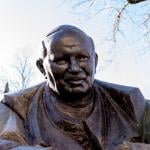KEN IN PENNSYLVANIA ASKS:
What effect do you think the Romney campaign had on Mormons?
THE GUY ANSWERS:
Politically, not so much. In favoring Mitt Romney, a notably devout member of their church, Mormons (a.k.a. Latter-day Saints) merely continued longstanding, lopsided fidelity to Republicans, including McCain 2008 and Bush 2004. Heavily Mormon Utah hasn’t voted for a Democratic president since 1964 or a Democratic U.S. Senator since 1970. As is customary, church officialdom carefully avoided hints of partisanship and the candidate himself purposely downplayed his faith.
There was one significant development, however. Key evangelical leaders did not question Romney’s candidacy despite major doctrinal disagreements, and their flocks went as heavily Republican as usual. Actually, in both 2008 and 2012 the nastiest attacks on Romney’s faith came from liberals whose audiences would have voted Democratic regardless. Polls showed wariness about Mormonism among some voters, but apparently that did not cause Romney’s loss. In a December survey by the Pew Research Center, Americans said they learned either “nothing” (50 percent) or “not very much” (32 percent) about LDS religion during the campaign. Two-thirds were able to identify Romney’s church affiliation. Among non-Mormons, 61 percent said the LDS faith is “very different” from their own, yet 53 percent judged Mormonism to be “Christian.” In an open-ended question, 24 percent volunteered favorable adjectives to describe Mormons, compared with 18 percent the previous year.
Writing in Trinity College’s “Religion in the News” magazine, a Protestant expert on the church, Jan Shipps, observed that Romney’s two runs were not the only recent factors enhancing LDS visibility. We had the much-promoted 150th anniversary of the pioneer trek to Utah (1997), the Salt Lake City Winter Olympics (2002), the Elizabeth Smart kidnapping (2002), efforts that helped pass a California referendum to bar same-sex marriage (2008), the church’s image-polishing “I Am a Mormon” ad campaign (2009), and Broadway’s “The Book of Mormon,” which is snarky but not antagonistic (2011). Also there’s more awareness of a U.S. flock that now numbers 6.2 million and is spreading across the landscape. After its first 170 years in existence the church had 32 temples for its sacred and secret rituals, but has added another 43 in just the dozen years since (counting those under construction).
Shipps distinguishes between “becoming a part of mainstream culture and becoming a part of mainstream religion.” Cultural assimilation was greatly aided by the 1890 end of founding Prophet Joseph Smith Jr.’s polygamy teaching and the 1978 elimination of the policy barring males of African descent from holding the “priesthood” and filling any church posts. (Utah black Mormon Mia Love would have made a helpful role model but fell 2,600 votes short of winning a U.S. House seat.) Catholic and Protestant authorities reject distinctive LDS tenets that remain, for instance that God the Father “has a body of flesh and bones” and is paired with the Mother in Heaven. Another big barrier is the LDS scriptural teaching that God directly told the founder in 1820 to shun every existing branch of Christianity because “all their creeds were an abomination in His sight.”
As a loser but religio-ethnic pioneer, Mitt Romney becomes the Al Smith of the Saints. Democrat Smith, the first Catholic nominated by a major party, won only 40.8 percent of the vote in a 1928 race rife with religious conflict, vs. Romney’s 47.2 percent. Since leaders of the faith are largely successful businessmen, it’s conceivable that someday the church might want Romney to be a mission president or one of the General Authorities who rule from Salt Lake City. Given LDS protocol, he’d be obliged to accept.
Political sidelights:
— The first Mormon to run for U.S. president was founder Joseph Smith himself, but he was murdered months before the 1844 election.
— During the early phase in Utah Mormons sponsored their own political party.
— In 2007, as Romney was gearing up for his first run, Senate Democrats elected adult convert Harry Reid of Nevada as majority leader. He was and remains the most powerful Mormon office-holder in U.S. history.












